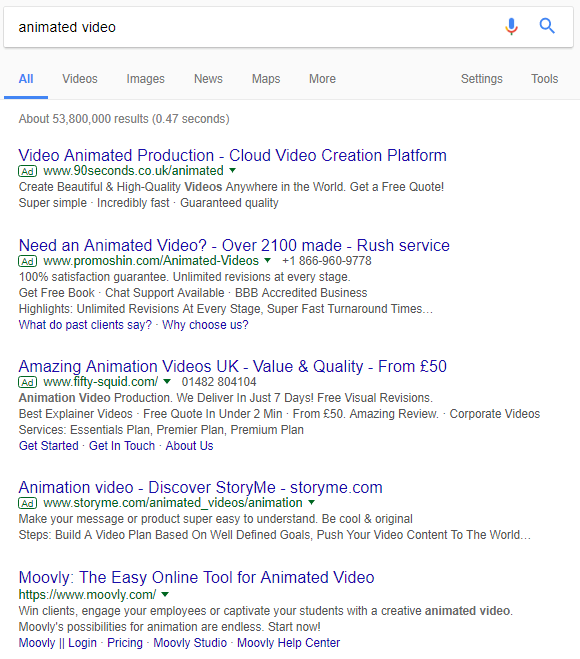Paid Search Ads Made Easy for Startups!
The most fundamental strategy for business success is to find out what people want, then put it in front of them in a way that resonates. Considering that there are over 6 billion searches inputted into search engines every single day, this is the best place to feature your products and services. Having your site show up in the first search engine results page for Google (which has over 77% of the market share of search engines worldwide) gives you a great chance to convert web searchers into paying customers.
With both SEO and SEM tactics, you can market your products and services to the most targeted audience possible: people who have searched for relevant keywords online. While definitions vary, SEO refers to free tactics that enable you to rank highly for certain keywords organically, whereas SEM usually refers to using paid advertisements which appear on search engine result pages.
For instance, if you search for the term “animated video” – you will get see 4 AdWords ads (SEM) before you get an organic result.

Paid search ads aren’t always textual. If Google determines that you’re searching for a specific product – you may be shown visual PLA ads on the side of your screen, as indicated below:

You may have heard horror stories about companies wasting inordinate amounts of money on paid search ads, or you’ve assumed that this type of marketing simply isn’t feasible for a startup budget. In reality, SEM allows companies with smaller budgets to compete with big players, all without a huge financial risk – since you can start small, scale what works and discard what doesn’t.
Objectives
Before you get started with AdWords (or a smaller paid search platform such as Bing Ads), it’s important to have clearly defined, measurable objectives for your campaign. Typically, you’ll be looking to acquire leads (email opt-ins) or paying customers.
For example, if you’re running a drop shipping eCommerce business and have a product which costs $3 to buy from your manufacturer, $2 to ship to your customer and you’re charging your customer $15 – your cost per acquisition must be $10 or less for you to remain profitable.
Be sure to set up conversion tracking in AdWords before you start your campaign and research as much as you can about the topic. If you’re not correctly tracking your progress, it’s impossible to scale a campaign when it’s profitable.
Keyword Research
In order to be successful with paid search ads, you need to know what keywords potential customers are searching for in your niche. While Google Keywords Planner is a perennially popular tool, I personally like to use Keyword Keg because it generates an abundance of keywords for Google, as well as YouTube, Bing and Yahoo. In addition to showing the search volume for each term, it also shows you the cost per click (CPC) if you want to run an AdWords ad for that particular term.
Keyword Keg is also excellent for performing product research, but that’s a different topic. Having searched the internet for muay thai shorts many times when I used to practice the sport, here are some of the search terms I’d want to be aware of if I was selling this type of product.

When performing keyword research, look out for words with commercial intent such as “buy”, “discount” or “cheap.” Conversely, words like “free” should go into your negative keywords list.
Paid Search Ad Design
Once you’ve got a budget for your campaign, it’s time to work on the ads themselves. Ad writing has a significant learning curve and you’re unlikely to craft a high converting ad on your first attempt. However, I recommend performing some Google searches and building a swipe file for AdWords ads in your niche.
Study the copywriting, compelling headlines, emotional trigger words and usage of scarcity in the ads of your competitors. Next, think of ways you can weave these elements into your ads to make them better.
Landing Page Design
Even if you have the most amazingly crafted AdWords ads, your conversions will suck if you don’t take the time to create good landing pages. Some marketers send Google users straight to their site’s homepage, which is crazy. Always link your AdWords ad to a relevant landing page which has been optimized for conversions.
Utilize testimonials for social proof, include a killer CTA and remove any distractions that may take away the person’s attention from hitting the purchase or opt-in button.
Do you have any questions about getting started with paid search ads for your startup? Let us know in the comments below?

Aaron Agius is the CEO of worldwide digital marketing agency, Louder Online, and, according to Forbes, among the world’s leading digital marketers. Working with clients such as Salesforce, Coca-Cola, IBM, Intel, and scores of stellar brands, Aaron is a Growth Marketer – a fusion between search, content, social, and PR. Find him on Twitter, LinkedIn, or on the Louder Online blog.
More by Aaron Agius: 5 Tips for Creating a Content Marketing Strategy for Startups that Actually Works!






